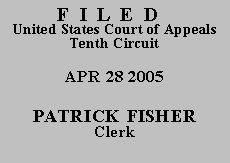

| DALE HARPER,
v.
JAMES GAMBLE, Correctional
Officer; GARY SNOW, Captain;
BRENT FATKIN |
|
The parties are familiar with the facts, and we need not restate them here. Having reviewed the matter de novo, we AFFIRM for substantially the same reasons iterated in the district court's order adopting the recommendation of the magistrate judge. Mr. Harper has clearly failed to demonstrate complete exhaustion of administrative remedies with regard to his deliberate indifference claims. See 42 U.S.C. § 1997e(a); Jernigan v. Stuchell, 304 F.3d 1030, 1032 (10th Cir. 2002). The district court's dismissal of Mr. Harper's claims against Defendants Fatkin and Snow in their individual capacities was proper, see Olson v. Stotts, 9 F.3d 1475, 1477 (10th Cir. 1993), as was the grant of summary judgment on the excessive force claim. Mr. Harper attempts to raise additional issues before this court, but such issues are deemed waived in that he did not raise them before the district court. See Singleton v. Wulff, 428 U.S. 106, 120 (1976).
Mr. Harper's motion to pay the appellate filing fee in partial payments is GRANTED. Mr. Harper is reminded that he is obligated to continue making partial payments until the entire fee has been paid.
Entered for the Court
Paul J. Kelly, Jr.
Circuit Judge
*. This order and judgment is not binding precedent, except under the doctrines of law of the case, res judicata, and collateral estoppel. This court generally disfavors the citation of orders and judgments; nevertheless, an order and judgment may be cited under the terms and conditions of 10th Cir. R. 36.3.
2. After examining the briefs and the appellate record, this three-judge panel has determined unanimously that oral argument would not be of material assistance in the determination of this appeal. See Fed. R. App. P. 34(a); 10th Cir. R. 34.1(G). The cause is therefore ordered submitted without oral argument.
1.We previously entered an order to show cause on appellate jurisdiction in this case. Plaintiff filed a notice of appeal four days prior to entry of the district court's Order dismissing Mr. Harper's suit. Mr. Harper failed to properly file a notice of appeal following entry of the district court's Order, but did file a docketing statement and a jurisdictional memo before this court. Either document may serve as the functional equivalent of a timely notice of appeal. See Smith v. Barry, 502 U.S. 244, 248-49 (1992). Accordingly, jurisdiction does lie.